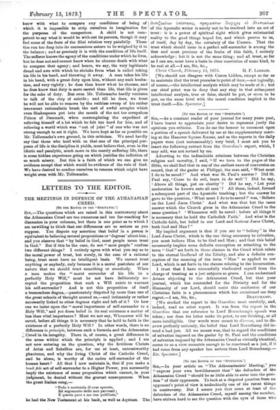LETTERS TO THE EDITOR.
THE MEETINGS IN DEFENCE OF THE ATHANASIAN CREED.
[TO THE EDITOR. OF THE "SPECTATOR.']
SIR, —The questions which are raised in this controversy about the Athanasian Creed are too numerous and too far-reaching for discussion in your columns, but there is one point as to which I am unwilling to think that our differences are so serious as you suppose. You dispute my assertion that belief in a person is equivalent to believing several propositions or 'dogmas' about him ; and you observe that "by belief in God, most people mean trust in God." But if this be the case, do not "most people" confuse two different things? I entirely agree with what you say as to the moral power of trust, but surely, in the case of a rational being, trust must have an intelligent basis. We cannot trust anything or anybody, only because it is a moral postulate of our nature that we should trust something or somebody. When a man makes the " moral surrender of his life to a perfectly Holy Will," must he not have deliberately ac- cepted the proposition that such a Will exists to warrant his self-surrender? And is not this proposition of itself a tremendous dogma,—passionately disputed by more than one of the great schools of thought around us,—and intimately or rather necessarily linked to other dogmas right and left of it ? Or how can we insist upon the "moral importance of self-surrender to a Holy Will," and yet deem belief in its real existence a matter of less than vital importance ? Must we not say, Whosoever will be saved, before all things it is necessary that he hold to faith in the existence of a perfectly Holy Will ? In other words, there is no difference in principle, between such a formula and the Athanasian ,..Creed in its integrity. There is, of course, a great difference in the areas within- which the principle is applied ; and I am not now entering on the question, why the fictitious Christa of Arius and Sabellius are, for me at least, untrustworthy phantoms, and why the living Christ of the Catholic Creed, and he alone, is worthy of the entire self-surrender of the human heart ? All that I now maintain is, that if you make a bond fide act of self-surrender to a Higher Power, you necessarily imply the existence of some proposition which cannot, in your judgment, be denied without the gravest consequences. When the great Italian sang,— " Fede e sustanzia di cos° operate, Ed argument* &lie non parventi; E questa pare a me sun quiditate,"
he had the New Testament at his back, as well as Aquinas. The of the Apostolic writer is surely not to be resolved into an act of trust : it is a power of spiritual sight which gives substantial reality to the good things hoped for, and which proves to us, of itself, day by day, the certainty of the Unseen. That the trust which should issue in a perfect self-surrender is among the first and most. precious of the fruits of this faith, I entirely acknowledge ; but it is not the same thing ; and all trust, so far as I can see, must have a basis in clear conviction of some kind, to be real at all.—I am, Sir, &c., Christ Church, February 13, 1873. H. P. LIDDON.
[We should not disagree with Canon Liddon, except so far as to maintain that the trust precedes in point of time,—not logically, of course,—the intellectual analysis which may be made of it ; but our chief point was to deny that any step in that subsequent intellectual analysis, true or false, should be put, or seem to be put, on the same level with the moral condition implied in the trust itself.—En. Spectator.]


































 Previous page
Previous page